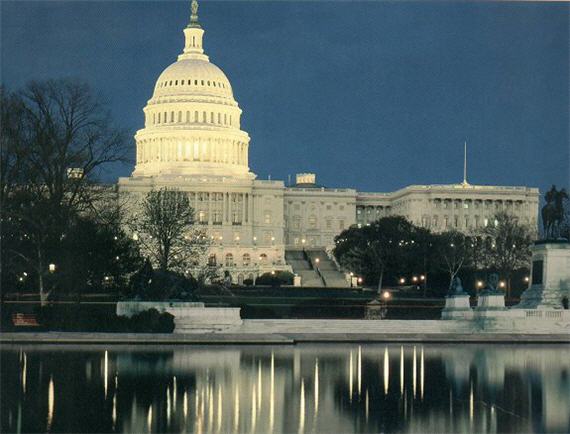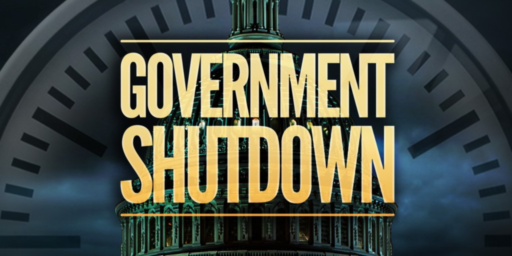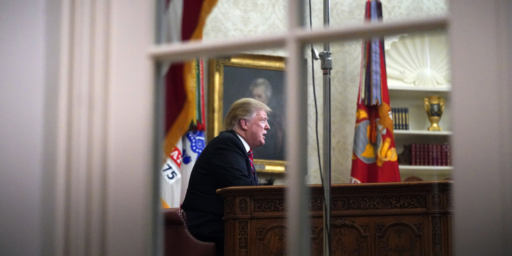Thoughts on the Likely Government Shutdown
A government shutdown is not just a hypothetical in a debating contest. It will affect real people.
 A continuing resolution for the remainder of the current fiscal year will not solve any long-term (or, really, even short-term) fiscal problems. As such, it does not strike me as a wise place to have a fight–especially one that will lead to a government shutdown, since a government shutdown will create its own fiscal problems by creating costs associated with recovering from the shutdown (and generate, in general, a host of inefficiencies).
A continuing resolution for the remainder of the current fiscal year will not solve any long-term (or, really, even short-term) fiscal problems. As such, it does not strike me as a wise place to have a fight–especially one that will lead to a government shutdown, since a government shutdown will create its own fiscal problems by creating costs associated with recovering from the shutdown (and generate, in general, a host of inefficiencies).
Given that the Democrats appear willing to accede to a number of Republican cuts, it would seem that they should take those gains and move on to bigger fights.
Further, I find it rather frustrating that there seems to be little acknowledgement from the Republican of this issue that a shutdown will actually affect real people. And I am not even specifically thinking about issues of people receiving services (although that is an issue worthy of consideration as well), but government employees (including deployed troops) who may miss at least one paycheck (if not more, depending on duration). Yes, they will eventually be compensated in full (with all of the commensurate inefficiencies entailed in such circumstances) but since most people rely on their paychecks to pay bills on the table right now, deferred payment is going to create any number of headaches for thousands upon thousands of persons whose only crime is working for the federal government (again, including members of the US military who are, in fact, public sector employees).
Most of the people reading this post likely would have a hard time paying all of their bills if even one paycheck was disrupted (especially if one is paid on a monthly basis). Sure, that shouldn’t be the case in theory (we should all have emergency funds and all that, just in case). And while, no doubt, some of us could weather such a disruption without serious problems, the bottom line would remain that it would be a significant disruption. And to what end? To me, the goal is ultimately to score political points and engage in political theater. The best possible interpretation is that a shutdown will help secure a pittance of additional budget cuts. Neither the best nor worst scenario strikes me as worth it.
A key element of politics (and, more importantly, governing) is knowing which battles are worth fighting as well as which hills are worthy to die upon. A handful of additional cuts, it strikes me, is not worth a government shutdown.
Further, the Republicans, and especially the Tea Party freshmen, need to understand that the institutional configuration of the US government is construed in such a way that controlling only one chamber of the legislature (not to mention lack of control of the veto-armed executive branch) simply means that one does not get everything one works. Compromise is rather necessary under such conditions.
Back to the fundamental issue that strikes me about all of this: a government shutdown is not just some symbolic action. Rather, it affects real people. It affects government employees, it affects people who receive services from the federal government, and it affects people whose businesses are linked, all or in part, to federal services (e.g., pharmacies that fill prescriptions for Medicare and Medicaid patients). This is not some debate over lunch at the student union building where all that is at stake is making some half-formed philosophical argument. This is real life.
My dissatisfaction with/critique of the Republican Party is that they seem not to take real life issues into sufficient consideration and, instead, seem more motivated by simplistic ideological positions (if not downright magical thinking). Part of why I highlight troops multiple times above is that they are supposed to be near and dear to the hearts of the GOP. Further, given the age range for most troops, they are quite likely to be living paycheck-to-paycheck. Where is that real concern about that fact? It seems to me that if we are going deploy (often repeatedly) young men and women to war zones, the least we could do is pay them on time.*
I also think pointing to military personnel in this case is noteworthy because they are, to repeat myself, public sector employees. Given the exalted place that members of the armed forces occupy in the Republican pantheon, this is quite ironic when one simultaneously considers the low place that public sector employees (as a generic category) occupy in that same pantheon. Indeed, the Defense Department is the largest employer in the US government, if memory serves.
I understand the basic notion from a conservative/Republican POV that government is too big. However, the use of a government shutdown as a tool of politics is to pretend like government is unnecessary–and yet we all know that that is untrue. There will be plenty of jokes, especially on talk radio, about the fact that when the government shuts down that no one will notice and yet, the point is: a lot of people will notice (and I made such jokes back during the Gingrich shutdown of 1995). However, to make such jokes is to forget on whom the joke is on.
Ultimately neither side is ever going to be able to fully implement its ideological vision for the country, which is likely a good thing. As such, it would be nice to see some reasonableness on this issue to prevail. But, alas, that is likely asking too much.
*I happen to know for a fact that a former student of mine, who is currently deployed, is quite concerned about lack of pay in the short term.






Stephen, with all due respect: you need an editor, or at least you need to proofread your posts.
Republican nihilism will probably have to play itself out.
Then they just need to win the message battle. Boehner, Bachman and assorted desperate for attention wanna-be candidates, versus Obama. Shouldn’t be a problem for the GOP. It’s not as if they’re up against anyone who can deliver a message in a tone of perfect reasonableness.
Meanwhile of course they’ve stepped all over poor Paul Ryan’s message He has a bad proposal, but it is at least an actual proposal with a certain amount of detail.
During the shutdown of ’95, I was 18 years old and just starting college, while my father was (and still is) a federal employee, as was our next-door neighbor, a single black woman with a teenage son. It was a difficult time, and we finally packed our bags and went to Florida to stay with my maternal grandparents until things got back to normal.
Though I didn’t realize it at the time, it was a defining moment in my political maturation, because it was probably the first time I got a really direct glimpse of the impact that politics could have on everyday lives. And when I hear political junkies on both sides of the spectrum salivating at the prospect of a shutdown now (liberals because they think it will hurt the GOP, tea-partiers because they’re a bunch of thugs), I really have to shake my head at the insensitivity to how it affects real people.
“Rather, it affects real people. It affects government employees”
The fact that you can write this sentence proves that you don’t understand the new, tea-smoking republicans in congress.
They think government employees are people (for now). But “real” people? “Proper” people? Nah.
As a part time nihilist, I object to being lumped in with the Tea Party.
One ironic consequence of the shutdown: the e-Verify employment check system is considered a non-essential service and would be shutdown. Which means that in Tea Party dominated states like Arizona that require all private employers to use e-Verify, it will be impossible to get a new job as long as the shutdown continues.
Oh, the humanities. Where was your concern when the Obama administration arbitrarily and as it turns out illegally shutdown deep water drilling in the GOMEX? Are those workers not real people to you? Or the tax hikes or EPA “global warming” regulations that are putting people out of work, not for a few days but for, well, for some, forever?
Government action has consequences, be it a government shutdown over budget control issues or some favored regulation. That you are concerned about the government employee, and the military, in this matter just shows your partisan focus on this one matter. Yes, people are foolish and live to close to the edge, most due to poor decision making and not exigent circumstances. But they shut the government down 15 years ago and it has been a risk for about every year if you’ve worked in government so having a backstop would have been proper. It might be at least acknowledged that government employees still drew their checks in the wake of Katrina even as their offices and work were gone. That wasn’t a benefit enjoyed by the average citizen.
So, yes, a government shutdown will impact a lot of people who are collateral damage. But then everything the government does, especially with taxes and strangling regulation, impacts a lot of people. And yet, these very same government employees impose those impacts on innocent citizens with nary a concern nor care of who they throw out of a job or whose livelihood they destroy. So cry me a river.
And, for the record, every deployed member of the military will have food, shelter and clothing provided. Those living away from bases in non-combat areas could have a cash flow problem. But they will all be paid. And they are all, while paid on a monthly basis, their pay is deposited in two payments on the 1st and the 15th.
To the Tea Party, government employees aren’t real people. They’re “takers, not makers.” Parasites sucking away the nation’s life blood.
It’s really easy to do lots of damage once you’ve decided that a certain class of people isn’t really human…
@Larry: I have little doubt that I need an editor (and would gladly welcome volunteers). Of course, little mistakes are easy to make (like spelling the name of the person you are addressing 😉
@JKB:
I amnot (note: left out this rather key word–adding to the notion that I need an editor!) persuaded by “arguments” that are of the formula: yeah, but what about X? Or: that was bad, too, and you didn’t say anything about that!
1) I have neither the time nor inclination to comment on everything.
2) Even if we assume that X was a bad thing and worthy of criticism, what does that have to do with Y?
The really funny thing is that you seem to be saying that government often does things that are bad for people, which you seem to think is a problem, and yet when it comes to this issue, your response is “cry me a river.” So which is it: should we care when there are bad effects from what government does, or should we not?
For the record: it appears that any government shutdown could affect the 4/15 payments you mentioned.
“Or the tax hikes or EPA “global warming” regulations that are putting people out of work, not for a few days but for, well, for some, forever?”
So you want the government to pretend the only thing that matters is… This year? Societies have to think on a longer time-scale.
If you planned your business assuming you get to put more carbon in the air forever, you are a retard. The US does not have anything to gain by ignoring long-time environmental effects. One of the first thing you learn in business school is to look at the macro and micro environs and plan accordingly. Sooner or later, someone in the government is going to realize CO2 is a threat – the fact that a business owner listened to people like you rather than scientists just shows they are bad entrepreneurs.
Screw along now, we are tired of the whining.
As though the levels of irresponsible levels of deficit spending aren’t affecting people?
Honestly, this seems like something coming from Josh Marshall’s Talking Point Memo, it’s all the Republicans’ fault for not willing to ride the unicorns with us!
Michael Reynolds, isn’t accelerating as we drive off a fiscal cliff sort of the ultimate nihilism?
“the Federal government of the United States put non-essential government workers on furlough and suspended non-essential services from November 14 through November 19, 1995 and from December 16, 1995 to January 6”
I’m not sure how that would force someone to go live with their grandmother. Especially with returning when things got back to normal which was a matter of weeks. It would cost more to move out then back in than to pay rent. Perhaps as a college student a person not the parents would go down to Florida during winter break but that is far from the heartbreak sounding story given.
Yes a Government shutdown affects some people. However spending this country into bankruptcy will hurt a great deal more people. Trying to turn this country to a socialist “we must take care of every sad case story” hurts a great deal more people. Dragging some sad case out every time the government wants to take even more of your money has gotten old.
Steven
Haven’t you given people grief on occasions about typos and poor grammar in the past? At least you and Larry aren’t being jerks about it above.
Re “If you planned your business assuming you get to put more carbon in the air forever, you are a retard”
I hope you are not claiming carbon last in the air forever.
Most people buy a car assuming the will get to put more carbon in the air for at least the lifetime of their car. Same goes for a house, power plant, etc. Are you claiming all those people are retards?
“And yet, these very same government employees impose those impacts on innocent citizens with nary a concern nor care of who they throw out of a job or whose livelihood they destroy.”
Can you define “government employees” please? If you define it as a politician, then yes you are right. However, the typical govt employee has no say in policy, but merely implements it on direction from higher authority. Just like private sector where the customer service rep that gets yelled at had no say in the policy that is the issue.
@Charles:
Your new move seems to be to say that posts are like X (where X is Josh Marshall today, and yesterday it was Yglesias or Ezra Klein).
I would note that that really isn’t much of a retort or counter-argument.
I would note that in this case, I do think that the Republicans, which have already appeared to have gotten the better of the negotiations, are more to blame than the Democrats. Further, the whole thing strikes me as a silly waste of time with no long-term implications of importance. As such, it doesn’t strike me as worth it.
@Wayne
I suppose I might have, although I try not to do so (partially because people who live in glass houses ought not throw stones). If I see something specific, I might leave a note about the need for correction.
“Most people buy a car assuming the will get to put more carbon in the air for at least the lifetime of their car. Same goes for a house, power plant, etc. Are you claiming all those people are retards?”
To a degree, yes. NO individual gets to assume the good-old days last forever.
The problem with many Westerners is that they are quite nostalgic and romanticize the days of their youth and most influential memories. But the only constant is change.
Since the US more than any other nation is founded on ideology and religion (ideology and religion stem from the desire to preserve ideas and values beyond their expiry date), every citizen of the US is a little bit too infatuated with what is already known. Even the most daring entrepreneurs in the US are probably at heart controlled by fear of loss more than anything else.
Which is why recalibrating healthcare became such a spectacle, and why every person who managed to squeeze out a kid or a small business believe they are entitled to a way of life dependent on cheap energy and a sitcom way of life.
“Those picturesque sitcom families get to pretend they are their own cosmos – why can’t *I*?”
The entire Tea Party movement is a reaction against change. And not the “Change” from the silly Obama campaign, but change as a universal constant. Why do you think W was not subject to the same responsibility the war criminals in the Third Reich were? Because everyone had to “move on”. LOL. Self-compassion is the American instinct.
Steven:
Good column, but there is NO assurance that Federal employees will eventually get back pay for the time they’re furloughed. Those deemed “essential” who report to work without pay will be, but the rest may well not (though they were in the 95-96 shutdowns); Congress has to agree to that.
Dr. Taylor, you give me too much credit for having a strategy or plan. Just a haphazard observation. You may be right about the Republicans but from where I sit, it seems a little different. IMHO, the Democrats are about 90% responsible for the nightmare we face, though YMMV.
Can’t all of the above arguments be made against the Democrats? If they care so much about the people who will get affected by the shutdown, why won’t they agree to the approximate 1% cuts in the budget? Sure, it would be great if everyone got everything they ever wanted from the government but this isn’t fantasy land. We see food and commodity prices rising as the Fed effectively monetizes the deficit, interest rates will reach a point where it will be impossible to pay for the current government functions, and if you think the poor and elderly are going to hurt with these very modest cuts just wait for another 10 years when their benefits are slashed beyond belief.
Again, the Democrats need to recognize they don’t control the entire government and part of our constitutional framework involves compromise. The Republicans came forward with an original plan to cut $100 billion from the budget and have since reduced those amounts. In less than two years the Dems will have their butts handed to them when the Senate swings back to the GOP.
Republicans and Tea Party types don’t recognize that government works are people. They think many if not most government works are parasites that earn money they don’t deserve taking away money from “real” Americans. So they do see that working for the government is the crime and that government workers should be punished. This is the argument that Republicanism won.
That and the fact that many Americans believe that the discretionary budget is like 90% of the budget so if you just cut everything then the accounts will be balanced in one or two budget cycles. Oh and then there is the tax cuts for the wealthy will magically fix the economy.
You are aware that the House passed a continuing resolution that (1) would have funded the Department of Defense until the end of the year (and paid those troops), and (2) would have averted a shutdown for one week. Reid screamed bloody murder and Obama said he would veto it. Who’s failing to acknowledge that a shutdown will affect real people?
Reid made it even more obvious this morning: he’d rather shut down the government than pass a rider that has passed several times in recent years: http://hotair.com/archives/2011/04/08/breaking-budget-deal/ .
Well, for all the horrors described, as someone who experienced the ’95/’96 shutdown firsthand, I can tell you that the trauma is short lived. Of course, if the Dems and Reps were to shutdown the government for a month or two, then that’s different. Then the public will start to see where the non-essential employees are missing.
Thinking more about this: the Administration has enough investment gurus on staff that we should invest intelligently and use the proceeds to get rid of the deficit. Hillary Clinton could work her magic on cattle futures and President Obama could pick a few sure-fire real estate deals.